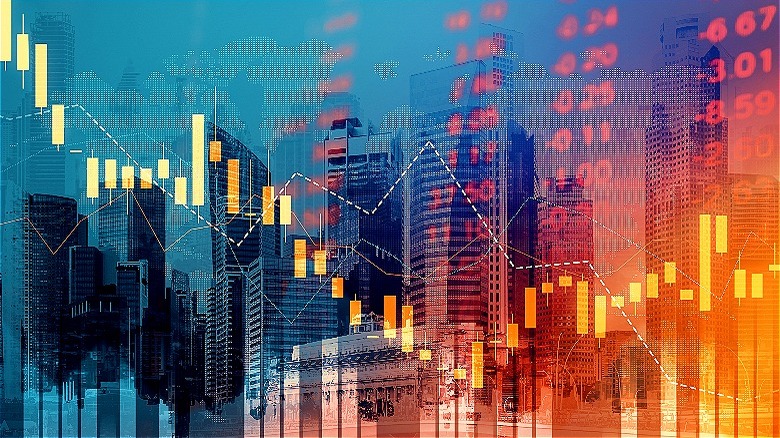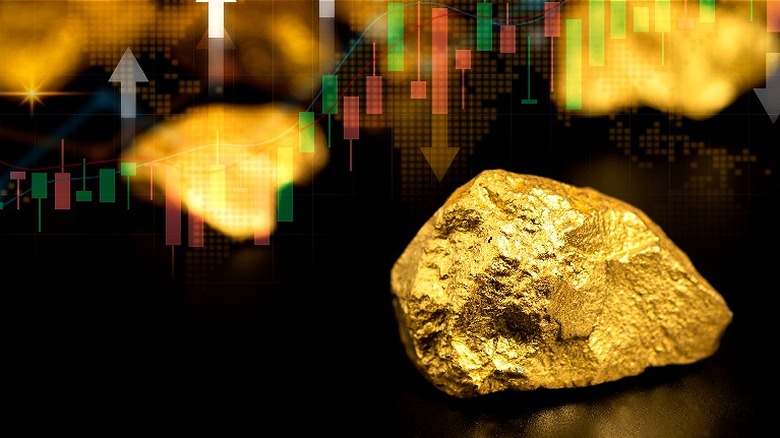What Actually Controls The Price Of Gold?
To be good as gold, worth your weight in gold, or to have a heart of gold. Even our idioms know it: Gold is good. But how much is gold actually worth, and why? What actually controls its price? Gold is a precious metal, and a very rare one. The element is hard to produce (at least without some dying stars handy). It's also expensive to mine and to refine. Add in the facts that, one, gold is impossible to replicate and, two, the amount already mined would fill just a few Olympic-sized swimming pools, and you get the idea: Gold supply is not exactly high, but demand is. Why?
One reason is that gold is pretty. It's been used in making jewelry since ancient times, and is still a symbol of wealth and status today. Just as valuable is gold's durability and its malleability. Even tiny amounts of the metal can be melted and reshaped for new purposes without breaking. That makes it possible for an antique gold necklace to be reborn as the next generation's wedding bands, or as an essential nontoxic, non-reactive, non-decaying component used across industries, from medical to aerospace.
But while the metal holds practical and cultural value, the rallies and drops in gold's market price move in mysterious ways. While physical demand for gold will always play some role, even today's economic experts don't fully understand all of the factors that account for gold price shifts. One thing's for sure, though: Fear is a factor. But is it what actually controls the price of gold?
Inflation and investor behavior
Historically, investing in gold has been considered a smart move; this due to gold's safe-haven asset status, borne from its global value and its consistent physical demand. Because gold has always been valuable, the assumption is that gold will always be valuable. Gold is looked at as a long-term store of wealth and a hedge against monetary inflation and devaluation of the almighty dollar.
It's a tricky relationship forged in the fires of the United States fully dropping the gold standard in 1971 to boost the economy. Typically, however, when the U.S. dollar is weak, gold prices are strong. The inverse is also usually true: When the dollar stabilizes or is doing well, the price of gold tends to drop. Investors tend to purchase gold and gold futures when inflation kicks into high gear, or there's a fear it will soon. Investors hoard gold in times of turmoil, which spikes gold's price. This includes individual investors, as well as algorithm-driven trading, and even central banks. But what happens when gold prices break from this pattern?
In recent years, gold prices have been rising exponentially, in spite of moderate inflation rates and a relatively stable economy. A few factors are at play here, including overseas buying by central banks, and an influx of novice investors from a younger generation driving up prices by investing in gold futures and physical gold. But what's with this recent trend? The answer is fear itself.
Fears, tensions, shutdowns, and distrust
Everybody's scared. Geopolitical tensions, active wars, global pandemics, climate disasters, bank failures, and any other global humanitarian and/or financial crisis you can think of from the last few years alone have drastically affected global shipping and supply chain, not to mention human lives. Financially speaking, such catastrophe (and the promise of more or escalating conflict) affects the price of gold, as well as faith in the dollar, and financial systems on the whole.
Consider that investors are buying Costco gold bars to the tune of $100 to $200 million in sales a month (via CBS News). Globally and domestically, central banks are also increasing their stores of physical gold to shore up reserves in fear of uncertain futures. "We know that China is increasing gold purchases amid rising tensions with the U.S. and its property crisis, [and] other emerging market central banks are also diversifying away from the dollar," Ipek Ozkardeskaya, Swissquote Bank senior analyst, told Dow Jones Newswires, via The Wall Street Journal, in March 2024.
Emotional and psychological factors affect the price of gold, too. While experts and average Joes alike will debate why, exactly, gold prices move as they do, it's clear the current rally reflects a global anticipation of inflationary events. Maybe gold can hedge against inflation, but prices today show investors are betting on gold to hedge against many fears.


